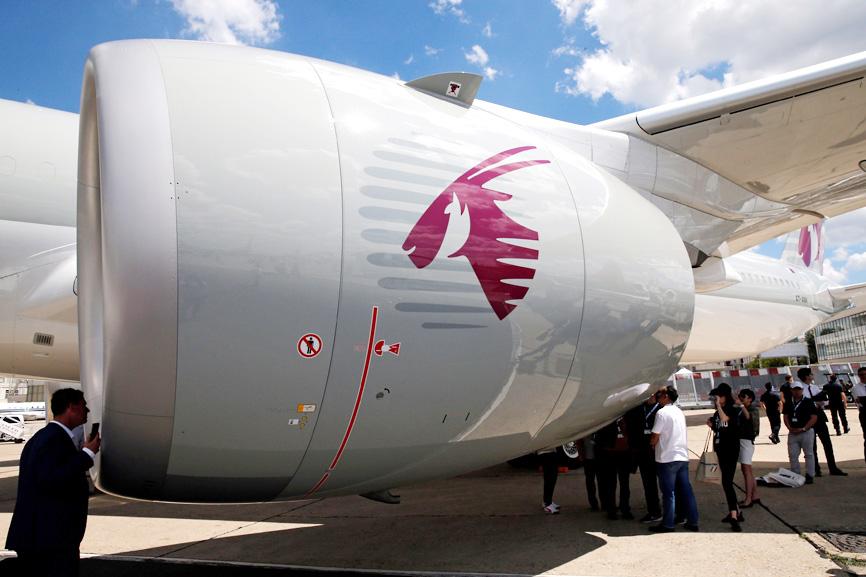Rolls-Royce Holdings PLC is scrapping its targets and final dividend to shore up its finances as the British aero-engine maker’s customers around the world ground planes due to the COVID-19 pandemic.
Rolls-Royce, one of Britain’s most historic industrial names, which before the pandemic struck was trying to emerge from a multiyear turnaround plan, has suspended its dividend for the first time since 1987.
The company’s engines power Airbus SE and Boeing Co’s widebody jets, but more than 60 percent of that fleet is now grounded, according to aviation data provider Cirium.

Photo: Reuters
Rolls-Royce is paid by airlines based on how many hours they fly.
Over the past six weeks, the headwind from the novel coronavirus was about £300 million (US$369 million) on flying hours that were 50 percent lower last month and expected to deteriorate further this month, Rolls-Royce said.
Rolls-Royce chief executive officer Warren East said that the company’s focus was on strengthening its financial resilience and as such it would be looking at cutting its cash expenditure, including reducing salary costs across its global workforce by at least 10 percent this year.
The company yesterday said that it had secured an additional £1.5 billion revolving credit facility, bringing its overall liquidity to £6.7 billion, to give it headroom during a potentially prolonged downturn.
Withdrawing its previously announced guidance for this year and noting the ongoing uncertain outlook, Rolls-Royce said that its board was no longer recommending its final dividend in respect of last year, saving £137 million.
The company said actions to reduce costs, including on non-critical capital expenditure projects, and salary cuts and deferrals for senior managers, would have a cashflow benefit of at least £750 million this year.
Rolls-Royce also warned that it was anticipating a reduction in engine delivery, and maintenance and overhaul volumes, affecting its revenue in the longer term.
The group’s power systems business, which supplies industrial customers, is expected to weaken this year, the company said.
Jefferies Group LLC analyst Sandy Morris said that Rolls-Royce’s update should give investors confidence in the company’s ability to cope with the downturn.
“There is plenty of liquidity. There are no worrying developments,” Morris said.
Shares in Rolls-Royce were up 13 percent at £2.84 in early trading. The stock has lost 55 percent over the past month.
Rolls-Royce relies on aerospace for just over half of its annual revenue, which was about £15 billion last year, deriving the rest from its defense and power systems businesses.

BYPASSING CHINA TARIFFS: In the first five months of this year, Foxconn sent US$4.4bn of iPhones to the US from India, compared with US$3.7bn in the whole of last year Nearly all the iPhones exported by Foxconn Technology Group (富士康科技集團) from India went to the US between March and last month, customs data showed, far above last year’s average of 50 percent and a clear sign of Apple Inc’s efforts to bypass high US tariffs imposed on China. The numbers, being reported by Reuters for the first time, show that Apple has realigned its India exports to almost exclusively serve the US market, when previously the devices were more widely distributed to nations including the Netherlands and the Czech Republic. During March to last month, Foxconn, known as Hon Hai Precision Industry

Taiwan Semiconductor Manufacturing Co (TSMC, 台積電) and the University of Tokyo (UTokyo) yesterday announced the launch of the TSMC-UTokyo Lab to promote advanced semiconductor research, education and talent development. The lab is TSMC’s first laboratory collaboration with a university outside Taiwan, the company said in a statement. The lab would leverage “the extensive knowledge, experience, and creativity” of both institutions, the company said. It is located in the Asano Section of UTokyo’s Hongo, Tokyo, campus and would be managed by UTokyo faculty, guided by directors from UTokyo and TSMC, the company said. TSMC began working with UTokyo in 2019, resulting in 21 research projects,

Taiwan’s property market is entering a freeze, with mortgage activity across the nation’s six largest cities plummeting in the first quarter, H&B Realty Co (住商不動產) said yesterday, citing mounting pressure on housing demand amid tighter lending rules and regulatory curbs. Mortgage applications in Taipei, New Taipei City, Taoyuan, Taichung, Tainan and Kaohsiung totaled 28,078 from January to March, a sharp 36.3 percent decline from 44,082 in the same period last year, the nation’s largest real-estate brokerage by franchise said, citing data from the Joint Credit Information Center (JCIC, 聯徵中心). “The simultaneous decline across all six cities reflects just how drastically the market

Ashton Hall’s morning routine involves dunking his head in iced Saratoga Spring Water. For the company that sells the bottled water — Hall’s brand of choice for drinking, brushing his teeth and submerging himself — that is fantastic news. “We’re so thankful to this incredible fitness influencer called Ashton Hall,” Saratoga owner Primo Brands Corp’s CEO Robbert Rietbroek said on an earnings call after Hall’s morning routine video went viral. “He really helped put our brand on the map.” Primo Brands, which was not affiliated with Hall when he made his video, is among the increasing number of companies benefiting from influencer